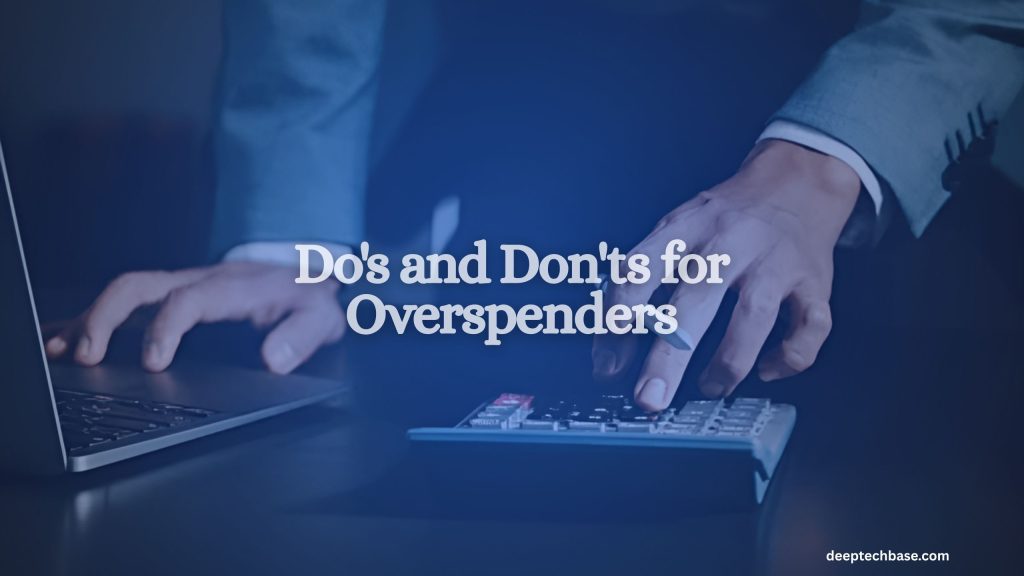You’re an overspender. Maybe you’ve always been one. Maybe you just became one. Either way, you’re reading this because something needs to change.
The good news? You’re not broken. You just need a realistic plan. Not a punishment plan. A real one.
The First Step: Admit It and Own It
Before anything else, you need to be honest with yourself. If you’re an overspender, say it out loud. Write it down. Own it.
This isn’t about shame. It’s about clarity. You can’t fix what you won’t acknowledge. Once you admit it, you’re already halfway to solving it.
Now set yourself up to prevent overspending. But do it realistically. Think about the kind of life you actually want to live—not the life you think you should live.
The DON’Ts (What’s Killing Your Finances)
DON’T: Spend Money You Don’t Have
This sounds obvious. But it’s the hardest part for overspenders.
You need to know three things:
- How much money comes in each month
- What all your bills actually are
- What’s left after those bills
If you don’t know these numbers, you’re flying blind. Sit down today and write them down. Get real with the numbers. This is your foundation.
DON’T: Set Budgets So Strict You’ll Never Follow Them
Here’s what kills most budgets: they’re too harsh.
You set a budget where you can’t go to a movie. Can’t eat out with friends. Can’t enjoy anything. Then one Friday night, you break it completely and spend $200 on stuff you don’t need.
Sound familiar?
Realistic budgets are ones you can actually stick to. That means building in fun money. Built-in experiences. If your budget has zero wiggle room, you will break it.
DON’T: Save Money While Carrying High-Interest Debt
This one confuses a lot of people.
You have high-interest credit card debt (usually 15-25% interest). You also want an emergency fund. Which should come first?
The debt. Always pay the debt first.
Here’s why: If you’re paying 20% interest on debt, that’s way more than any savings account will earn you (usually 4-5%). It’s like running on a treadmill going backwards. Pay down that credit card debt first. Then use that freed-up money to build your emergency fund.
DON’T: Carry More Debt Than You Earn in a Month
Simple rule: If you earn $4,500 a month, don’t carry more than $4,500 in revolving credit card debt total.
Even better: Try to pay off revolving debt each month. If you can’t, aim to pay it off within 12 months.
This keeps you from spiralling into debt that takes years to escape.
The DO’s (What Actually Works)
DO: Automate Your Finances
This is a game-changer.
Set up automatic payments for:
- Bill payments
- Savings transfers
- Investment contributions
When you automate, you don’t have to think about it. The money moves automatically. You focus your energy on making more money, not on juggling bills manually every month.
Most banks make this incredibly easy. Do it today.
DO: Have Fun (Seriously)
You earn money for a reason. Yes, to pay bills. But also to actually enjoy your life.
Prioritize experiences over things. Go out with friends. Take a weekend trip. See a movie. Enjoy a nice meal.
The exception: Things that are investments. A reliable home. Quality work clothes. Good tools for your job.
Money that goes toward real experiences and smart investments? That’s not overspending. That’s living.
DO: Save Your Raises and Windfalls
Every time you get a raise, don’t increase your spending. Save it.
Got a tax refund? A bonus? An unexpected gift? Save it.
Here’s the magic: If you’re already meeting your bills and having fun, this extra money won’t hurt. But it will transform your financial future. Use it to pay off debt faster or build retirement savings.
DO: Embrace Change
Changing spending habits is hard. Whether you’re breaking a bad habit or building a good one, it takes time.
But this is worth the effort. Money isn’t just about numbers. It’s about freedom. It’s about options. It’s about being able to live the life you actually want.
That’s worth changing for.
Frequently Asked Questions
Q: Can I stop overspending overnight?
A: Unlikely. But you can start today. Focus on one change at a time. Automate your finances first. Then tackle the high-interest debt. Progress beats perfection.
Q: What if I don’t know my exact expenses?
A: Track your spending for one month. Write down everything. This gives you a real picture of where your money goes. Most people are shocked by what they find.
Q: Is it okay to still spend on fun things?
A: Absolutely. A budget with zero fun money will fail. Build in money for experiences. This keeps you sane and makes the budget sustainable.
Q: How long does it take to fix overspending?
A: It depends on how much debt you have. But you’ll feel different in a few weeks. The structure helps. The progress motivates you.
Q: What if I get tempted to overspend?
A: Remove the temptation. Unsubscribe from marketing emails. Delete shopping apps. Leave credit cards at home. Make it harder to overspend, easier to stick to your plan.
Being an overspender doesn’t make you irresponsible. It makes you human. Most people struggle with money at some point.
The difference between people who fix it and people who don’t? The ones who fix it take action. They admit the problem. They set realistic limits. They automate what they can. They celebrate small wins.
You can be that person.
Start today with one thing. Just one. Automate a bill payment. Write down your expenses. Transfer $20 to savings. Pick something small and do it right now.
Then tomorrow, pick the next thing.
That’s how you go from overspender to someone who has their finances under control. Not through perfection. Through progress.
Your future self will thank you.

